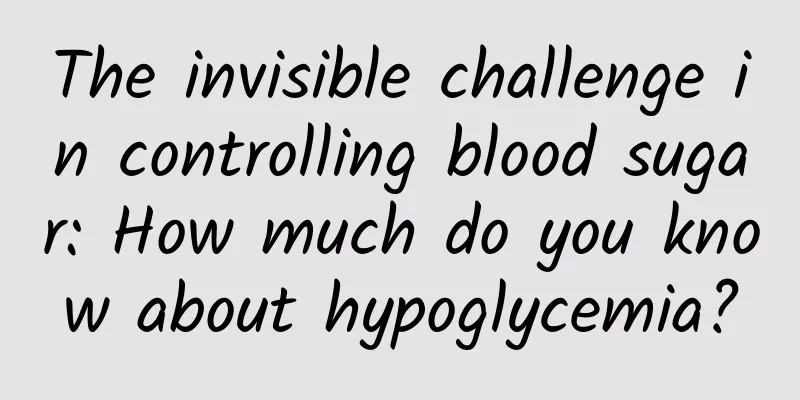The invisible challenge in controlling blood sugar: How much do you know about hypoglycemia?

|
Author: Zhu Jing, Hanzhong Central Hospital, Shaanxi Province Reviewer: Wang Yeju, Chief Physician, Hanzhong Central Hospital, Shaanxi Province In the world of diabetes, controlling sugar is a silent battle, and hypoglycemia, this "uninvited guest", often inadvertently becomes a "sweet trap" that diabetic patients need to be vigilant about. Through this popular science article, we will unveil the mystery of hypoglycemia for you, so that every "diabetic friend" can become the guardian of their own health. 1. Definition and hazards of hypoglycemia When the blood sugar concentration of a diabetic patient is ≤3.9 mmol/L, it is considered hypoglycemia. Hypoglycemia may not only disrupt the normal rhythm of life, but also bring serious health risks. Long-term and repeated hypoglycemia may also cause irreversible damage to the brain, increase the risk of cardiovascular disease, and seriously affect the patient's quality of life. Figure 1 Copyright image, no permission to reprint 2. Typical symptoms Typical symptoms of hypoglycemia include: ① sudden hunger, often accompanied by a strong desire to eat; ② palpitations and sweating, including accelerated heartbeat and cold skin, especially the forehead and palms; ③ dizziness, feeling top-heavy; ④ emotional instability, irritability, anxiety or depression; ⑤ inattention and memory loss, and in severe cases, confusion or even coma may occur. 3. Causes of Hypoglycemia There are many reasons for hypoglycemia in diabetic patients, and special attention should be paid to the following points: ① Excessive or improper use of hypoglycemic drugs; ② Irregular diet, especially not eating for a long time or eating too little; ③ Excessive exercise, especially exercise on an empty stomach, and failure to replenish energy in time after exercise; ④ Drinking, especially drinking on an empty stomach; ⑤ Impaired liver and kidney function, affecting drug metabolism and blood sugar regulation; ⑥ Taking other drugs that may cause hypoglycemia at the same time. IV. Preventive measures To prevent the occurrence of hypoglycemia, diabetic patients should do the following: ① Eat regularly, at regular times and in regular amounts, to ensure balanced nutrition; ② Exercise properly, avoid exercising on an empty stomach, monitor blood sugar before and after exercise, and replenish energy appropriately; ③ Strictly follow the doctor's orders for medication, and do not increase or decrease the dose or change the medication at will; ④ Monitor blood sugar regularly to understand the trend of blood sugar changes; ⑤ Carry sugary foods with you in case of emergency; ⑥ Carry a disease "ID card" (a card with diabetes, emergency contacts, and their phone numbers) when going out. Figure 2 Copyright image, no permission to reprint 5. Coping methods and self-help Once hypoglycemia occurs, diabetic patients should take self-help measures immediately: ① Quickly replenish sugar, such as sugary drinks, candies, biscuits, etc.; ② Monitor blood sugar to confirm whether blood sugar has returned to normal; ③ If the symptoms are severe or cannot be relieved, seek medical attention immediately. 6. Medication Adjustment and Management Diabetic patients should closely monitor their blood sugar, consult a doctor when appropriate, and adjust the type and dosage of hypoglycemic drugs according to the doctor's advice. When using insulin or insulin secretagogues, special attention should be paid to the time and dosage of use to avoid overdose and improper use. At the same time, information such as the half-life and peak time of commonly used hypoglycemic drugs should be understood in order to better self-manage blood sugar. 7. Dietary advice and monitoring A reasonable diet is the key to preventing and controlling hypoglycemia in diabetes. Diabetic patients should follow the following dietary recommendations: ① Eat foods that do not cause a sharp rise in blood sugar levels after eating: such as whole grains, beans, fresh fruits and vegetables, etc.; ② Control total calorie intake and avoid overeating; ③ Eat meals at regular times and in fixed amounts to avoid not eating for a long time or eating too little; ④ Eat a balanced diet to ensure a reasonable intake of protein, fat and carbohydrates; ⑤ Monitor blood sugar after meals to understand the effects of different foods on your own blood sugar. Let us, together, use knowledge as a shield and science as a sword to bravely face the challenges brought by diabetes, stay away from the "sweet trap" of hypoglycemia, protect our own health and happiness, and enjoy a healthy life. References Chinese Medical Association Diabetes Branch. Guidelines for the prevention and treatment of type 2 diabetes in China (2020 edition)[J]. Chinese Journal of Endocrinology and Metabolism, 2021, 37(4): 311-398. |
<<: Does your child keep blinking? Beware of abnormal blinking in children!
>>: Do you carefully observe your urine every time you go to the toilet?
Recommend
What happens if you eat popsicles during your period?
It is best to eat some refreshing and nourishing ...
What is Down syndrome screening and what does it specifically check for?
Down syndrome screening is a test method that is ...
I found out I was pregnant 1 month after my eyebrow tattoo
Eyebrow tattooing is one of the most common cosme...
Will pelvic adhesions recur after surgery?
Pelvic adhesion is a common gynecological disease...
What are the dangers of exercising during menstruation?
Many female friends have been choosing some fitne...
I didn't know I was pregnant and there was blood in the bed
Many pregnant women do not know that they are pre...
What foods are good for your ovaries?
The ovaries are the female reproductive organs. N...
What are some ways for girls to exercise?
Girls are generally lazy. In our country, female ...
Does a plus sign on a pregnancy test mean you are pregnant?
To put it simply, a pregnancy test stick is a too...
Will abortion cause habitual miscarriage?
What should you do if hasty abortion leads to hab...
Women's sagging must be taken seriously
Uterine prolapse is also a common gynecological d...
How long can you keep frozen breast milk after thawing?
Many children are breastfed from birth. During th...
What to do if pregnant women have stomach discomfort
For women, the most worrying thing during pregnan...
How to treat hair loss in girls?
Everyone actually experiences hair loss, it’s jus...
What to do if the leucorrhea is yellow-green and lumpy
Women are very susceptible to various gynecologic...









